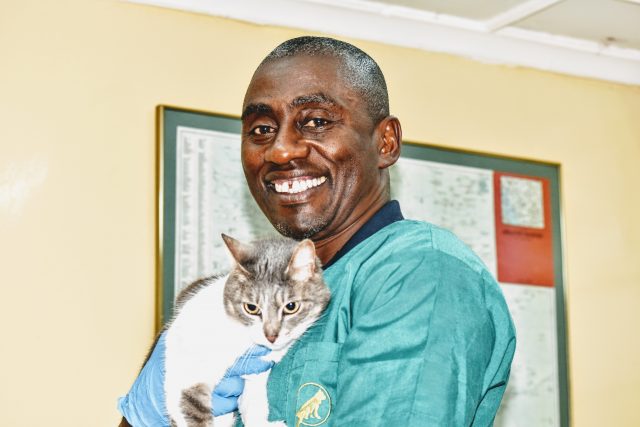By Leah Gitau
“Having grown taking care of livestock at my grandmother’s home in Kilifi, they would sometimes fall sick and I was left wondering what to do with the ill animals. I would watch the sheep, goats and chicken wail in agony, and this broke my heart. This is where my veterinary passion began. I longed to become a Veterinary doctor one day and get a chance to treat these animals.” Dr. Andrew Matole Konde narrates as he takes us through his journey of becoming the successful veterinary surgeon he is today.
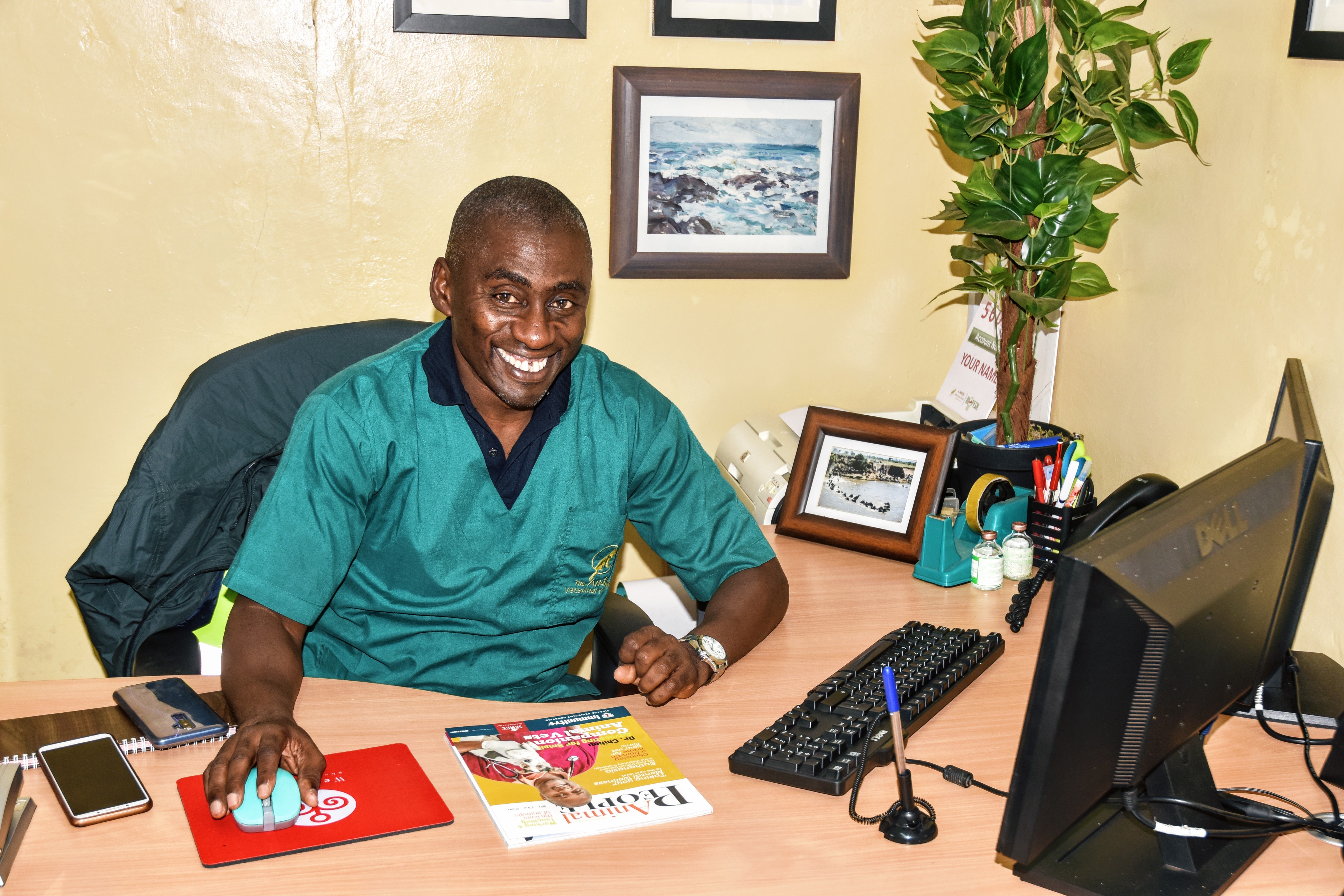
Other than the passion developed due to spending time with the animals, Dr. Matole’s love for Biology is something that can also be attributed to his zeal for the veterinary profession. Having performed extremely well in his A levels, he came to a decision that veterinary medicine is what he was going to pursue. He however understood that the profession came with its own challenges like juggling your mind with books, being on your toes always and keeping yourself updated for eternity but that is what he wanted.
Dr. Matole actualized his dream of venturing into the profession at the University of Nairobi in 1993 where he studied Bachelor of Veterinary Medicine.
Between the year 2000 and 2001, he proceeded to the University of Sydney, where he pursued a Diploma in Opthalmology and Internal Medicine.
In 2015, he attained his Master’s degree in Small Animal Veterinary Medicine at the University of Nairobi. Dr. Matole is currently pursuing a PHD in Public Health at Jomo Kenyatta University of Agriculture and Technology.
Dr. Matole takes us back to when he finished his college studies back in 1993 and a fellow student asked him what he wanted to do after school. “My vision is to work in a veterinary clinic for 10 years”. He said. Laughable. Right? The friend wanted to know why and Dr. Matole’s response was straight. So he could gain experience opening his own practice.
True to his word, when the holidays came knocking, Dr. Matole would work in a veterinary clinic in his neighborhood for a small stipend, sometimes voluntarily. This is where his experience grew, and skills expanded. He insists that, experience is what has kept him in the profession to date.
Dream of establishing a veterinary clinic come true
From a young boy with a dream, to a renowned veterinary surgeon with his own chain of veterinary clinics, Dr. Matole is the founder and Managing Director at Andys Veterinary Clinic.
Andys veterinary clinic was established in the year 2004 and has three branches. Two in Nairobi (Loresho and Ngong road) and the third in Nanyuki.
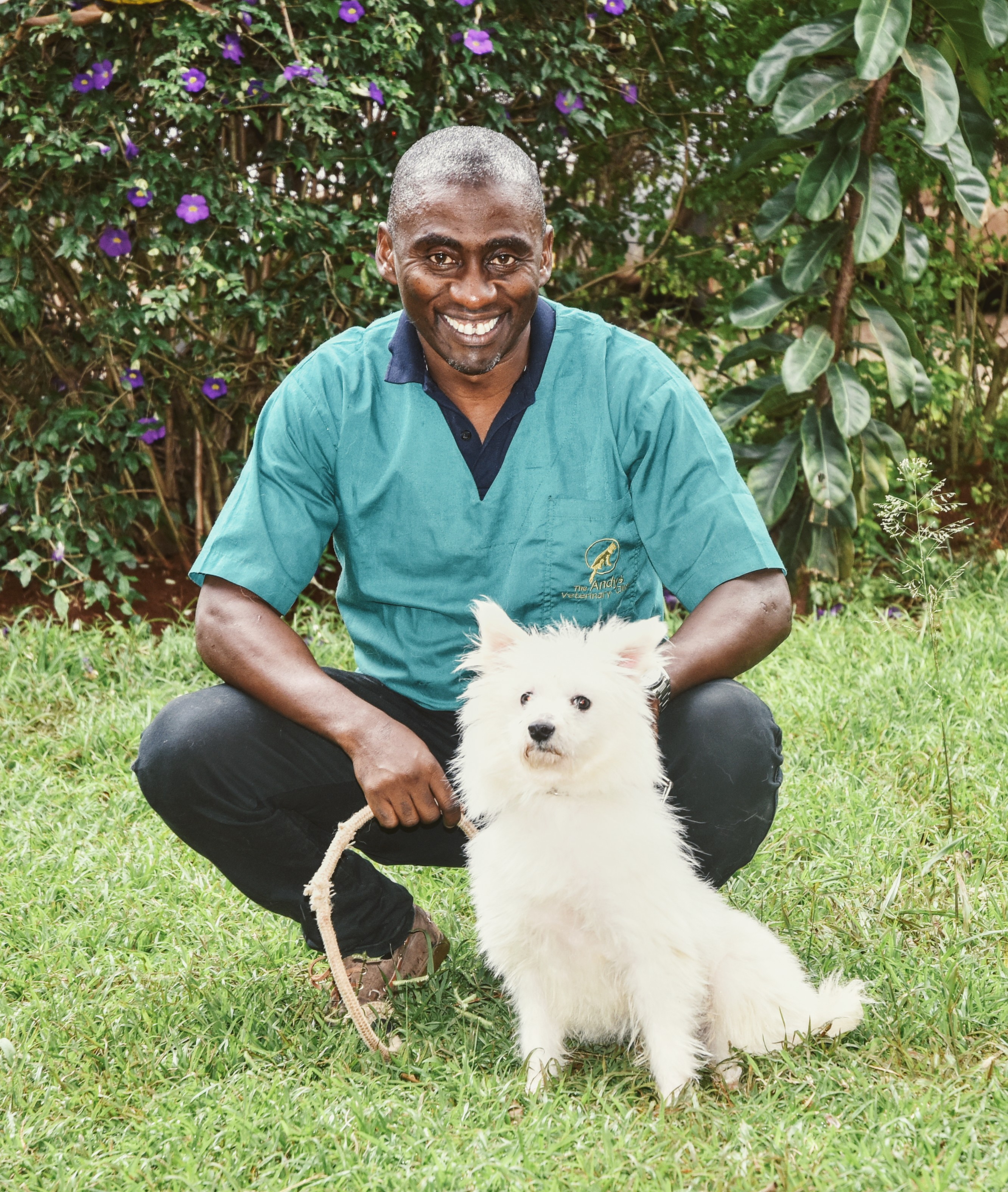
The Clinic has had close to 40 interns who have gone on to practice elsewhere with others who have chosen to start their own practices. The clinic Specializes in small animal internal medicine, occasionally dealing with large animals as well. The Andys deals with corporate and individuals, all of whom love their pets and treat them as family members, many of whom keep animals as working dogs or for companionship. The Andys offers services to a wide range of animals, dogs, cats, hamsters, pet birds, tortoises, turtles, snakes, lizards, crocodiles, as well as large animals.
Unique Offerings at the clinic include;
Ambulatory, concierge medicine- house visits and treatments including surgeries on site. This enables them to be better in touch with their clients, get to observe them in their natural environment, meet them at their point of need and also, at the convenience of their clients who don’t have to make the visit to the clinic if they do not wish to do so.

They operate 24 hours a day, 7 days a week, 365 days a year offering emergency as well as regular services.
Rationale to consider before establishing a veterinary clinic
“While a big number of veterinarians choose to work as associates within an already established veterinary practice, a good number also prefers building a new practice from the ground up. Starting a veterinary clinic can be a difficult task, but with careful planning and enough experience, the process can run quite smoothly.” This is according to Dr. Andrew Matole.
Once one is confident with the experience gained theoretically and practically, finding a good name for your clinic is vital. A good name that correlates well with the services that you offer at the clinic will always see clients streaming in to seek your services. “A good name is critical for all advertisements, building signage, and the website.” Says Dr. Matole.
The location of the veterinary practice is a factor that should be highly considered when coming up with the veterinary practice. One cannot settle on establishing a large animal veterinary clinic in the suburbs. Residents in these kinds of places do not invest in large animals, neither do they have enough space to rear these animals. Perhaps the small companion animals. The latter would be best to establish a clinic for in such areas. The accessibility of the location should highly be considered as clients love places that will not give them headaches of having to jump potholes and falling into a ditch. One should also consider a location with families with pets for a higher potential of clients. Once the location is secured and all the necessary permits acquired, the clinic needs to be fitted with a variety of supplies, medical equipment, laboratory instruments, and drugs. Some clinics also choose to offer pet food and pet supplies.
Registration of the practice. Any legal business needs to be registered and for any individual wishing to establish a veterinary practice in Kenya, these are the requirements; a Bachelor’s in Veterinary Medicine (BVM), a registered member of Kenya Veterinary Board (KVB) and a registered member of Kenya Veterinary Association (KVA). One also must have completed their internship with an accredited organization.
Attracting clients to the practice. Once everything is in place, the final step is to open the doors and make sure that members of your community know that you are open for business. If a good marketing plan is in place you should be well on your way to establishing a successful veterinary practice.
For Dr. Matole, having established his own Veterinary clinic, getting people to know about the clinic was another whole new process. For many vet clinics, using social media marketing, direct mail advertising, local magazine advertisements, radio or TV coverage of the clinic’s opening works for them.
“Advertising on my already established website, personal Facebook page, twitter handle, sign boards and issuing out business cards worked for me. I was able to capture potential clients’ eyes through numerous adverts.” He narrates.
Retaining the clients. It is one thing to have clients visit your clinic but is another to convince them to stay because every client comes with their own expectations which if you fail to meet, the relationship goes haywire. They expect you to educate them even more of what they know and be on top of your game. You must do a good job without compromise.
“By performing the right lab tests and administering the right treatment, you win the client’s heart and you can be assured that the client will come back to seek your excellent services. You can have a good website but if it does not match with your work, you are bound to fail terribly.”.
Achievements as a veterinary surgeon?
As a veterinary surgeon, Dr. Matole has been able to help animals better their lives. Treating creatures who cannot speak for themselves is not something that can be overlooked. Dr. Matole says that he relies on the Subjective, Objective, Analysis and Planning(SOAP) method to help diagnose his patients. He then uses Problem Oriented Medical Records (POMR) to treat the patients. According to him, these two have worked really well in restoring his patients into good health.
The Andys Veterinary Clinic not only focuses on attending to animal patients but also giving back to the community. Students on attachment, interns from vet schools and volunteers all come to learn from his clinic and this has really impacted the society in a positive way.
The clinic has also created employment opportunities for the staff who work in the clinic. From pet groomers, caretakers and other upcoming veterinarians.
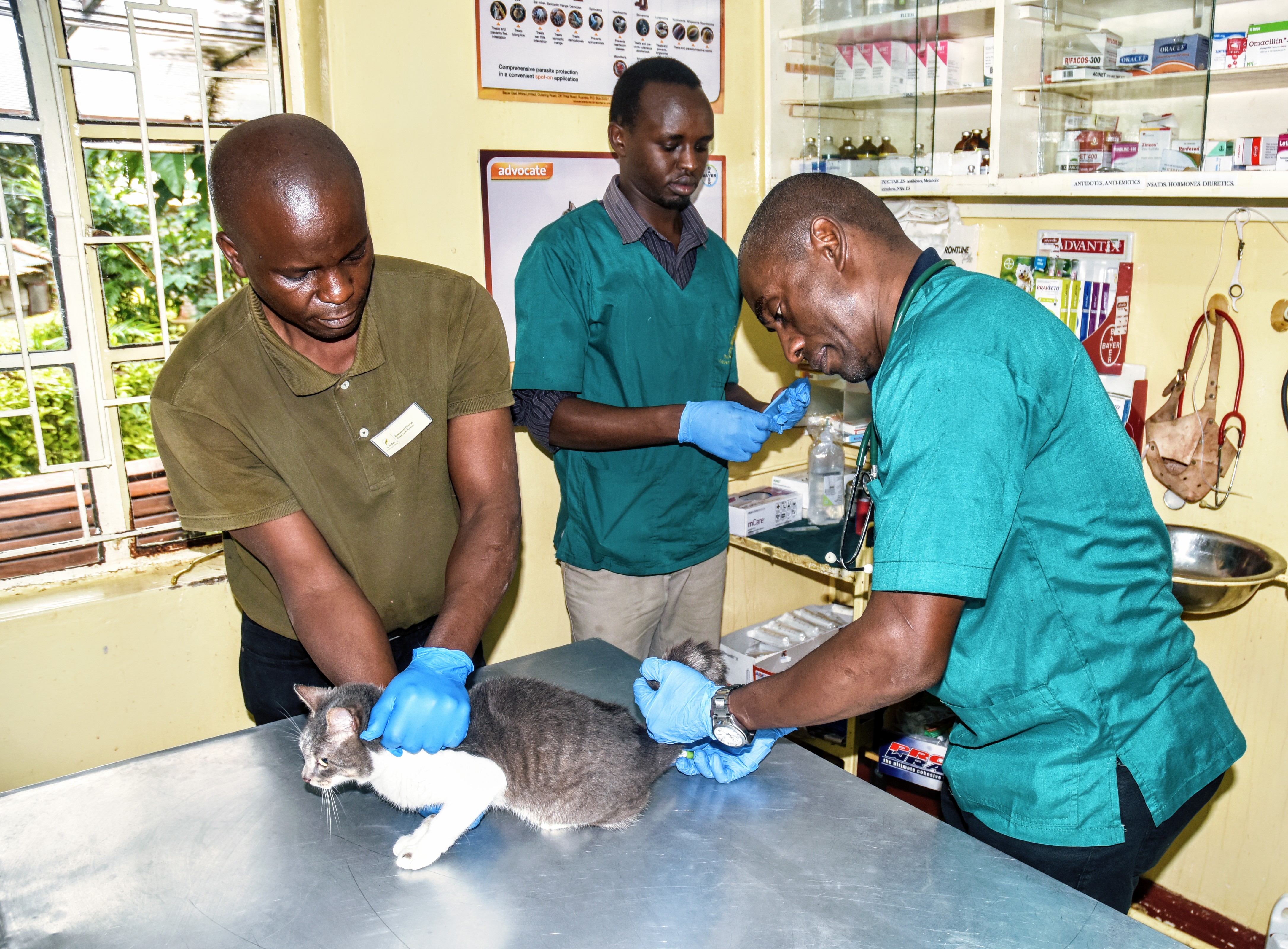
Further, Dr. Matole has shown that it is possible for one to come up with their own veterinary clinic, for as long as they have the right skills, experience and above all, the zeal to work with animals.
Opportunities in treating the small companion animals?
There are numerous opportunities involved in treating small companion animals. Such include dog breeding, pet grooming, dog training, boarding facilities, pet shops, pet foods which are sold to veterinarians so they can in turn sell to their clients.
The small companion animal industry has a number of career paths for people who want to work with small animals. Such jobs include caretakers in rescue shelters, animal trainers, groomers, pet sitters and kennel attendants.
Typical duties of animal service workers include feeding, cleaning living spaces, monitoring for health problems, exercising, bathing or training animals to perform specific behaviors. Most service jobs with small animals don’t require formal education. Rather, workers learn on the job.
Pressures around the profession
According to Dr. Matole, working as a veterinary surgeon has taught him a lot in life. He owes this to the everyday challenges he encounters in his line of profession of attending to both human and animal patients.
Pet owners are as diverse as they can be. No two owners are the same. They have different ideological beliefs, religious and cultural practices and individual wants and demands.
Dr. Andrew has learned that emotional intelligence is key. Listening and attending to each unique client’s needs whilst still ensuring the best interests of the animal is key. Equally, no two animals are the same, even though they may be the same breed. Animals have personality too and being attentive to the animal, beyond what the client tells you will go a long way in ensuring they get quality healthcare.
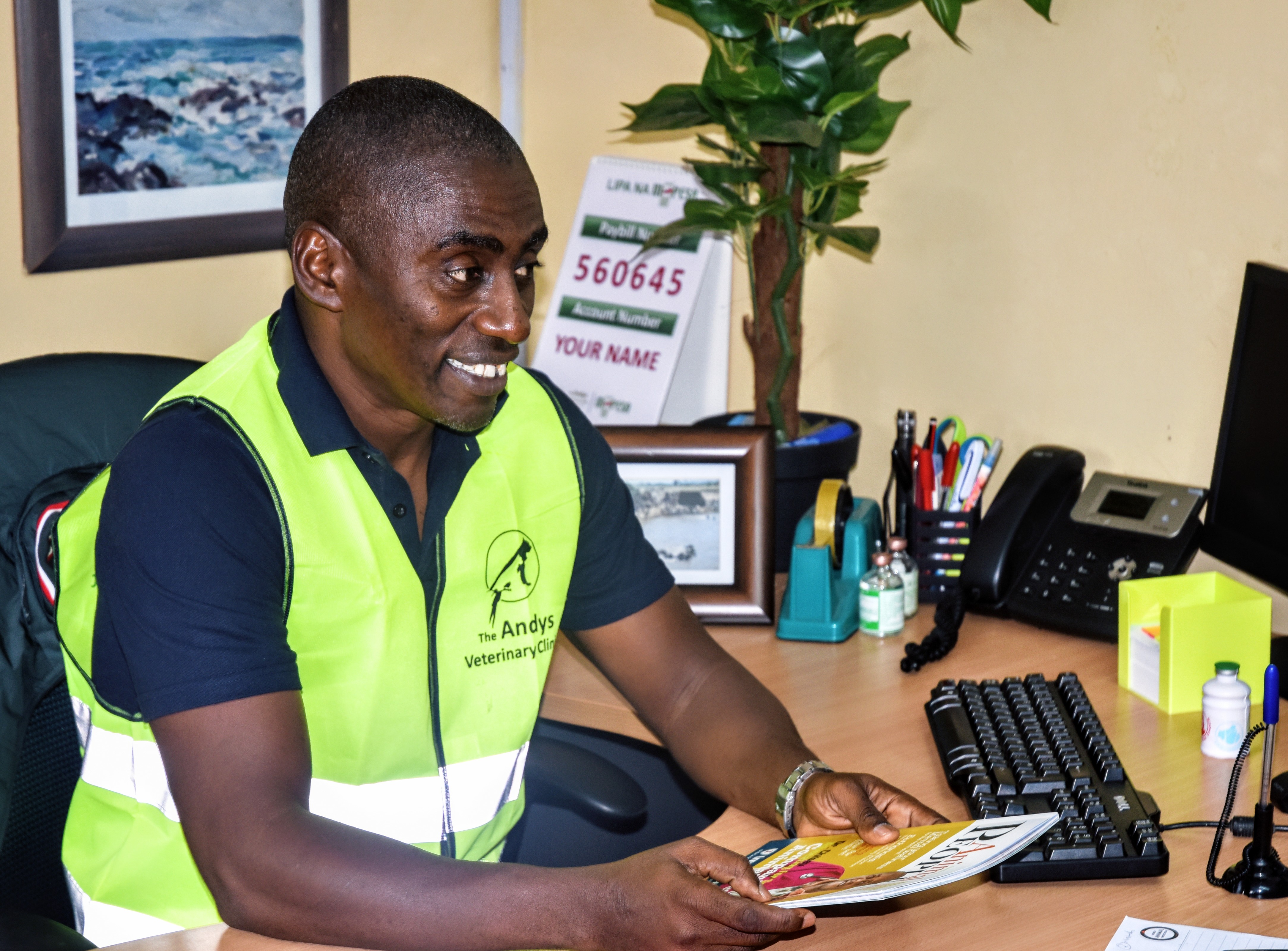
The high pressure and top demands of the job, as well as the long, unpredictable hours take a toll on the veterinarian’s mental health. Indeed, there are growing cases of depression and even suicide among those in the profession. The proverbial work-life balance can become quite challenging for veterinary surgeons too. Dealing with the death or loss of a patient, also takes its toll doctors. Every doctor works hard for the survival and good health of their patients, so losing one, is understandably disturbing as we create emotional attachments with the animals too. In addition, the veterinary surgeon also has to engage in some counselling with the clients who are distraught by the loss of their beloved pets. Or, in some cases, deal with the fallout that results. All these factors are sure to put pressure on the doctors’ emotional and mental well-being. Burn out would be the result if these issues are not dealt with accordingly and in good time.
Work burnouts is also a major challenge in this profession. The veterinarian surgeons work for long hours with little rest and this results to the body not being able to with hold the pressure, leading to a breakdown of major organs. The effects of working long hours combined with issues such as emotional pressure, financial issues, unrealistic expectations, and dealing with distressed clients place considerable stress on both the vet themselves and their families at home. Failure to cope with such stress upsets mental well being and can lead to serious emotional, physical, and behavioral issues.

Managing the strains
Having practiced for over 20 years, Dr. Matole recommends being strong as a major mechanism of coping with the stresses associated with this profession. One has to develop a thick skin so as not to affected by harsh comments of distressed clients. “You realize you have another life other than just waking up to attend to animal patients every day. If you do not find your inner strength, then you cannot balance work and family life.”
Attending workshops on talks on how to cope with these challenges has always come in handy for him. This way, he is able to listen to the experiences of other veterinarians and how they have managed to overcome over time.
Having a strong support system like family and friends is important. There is no greater relief than having the love and support of family and friends and also developing other interests outside of work that would help relieve your mind like sporting activities, working out at the gym, running, reading among others.


